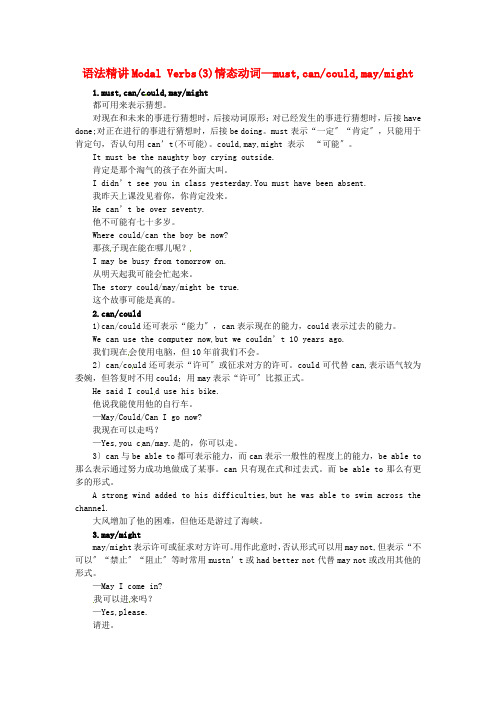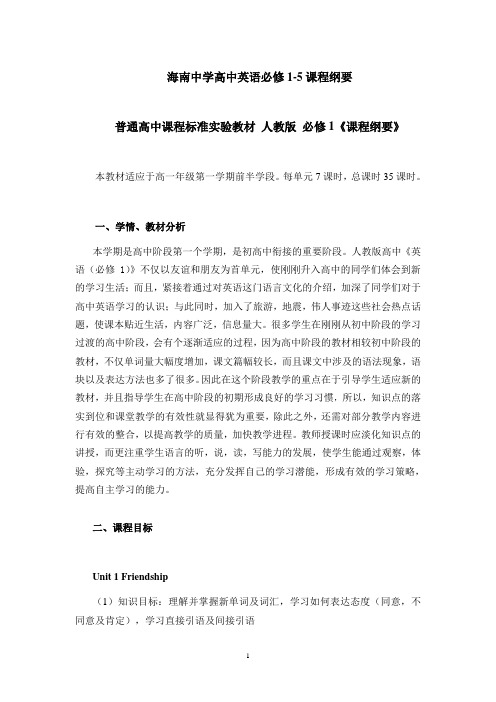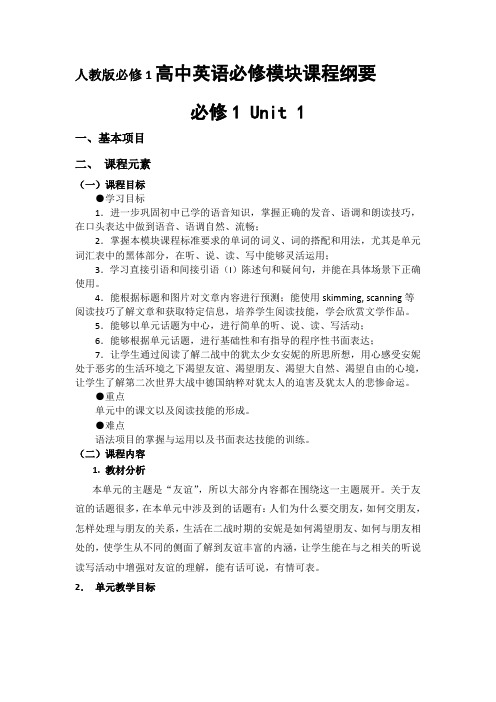高中英语必修模块课程纲要(15)
高中英语校本课程纲要

高中英语校本课程纲要一、课程标准培养和发展学生的英语学科核心素养,德树人的根本任务。
构建高中英语共同基础,满足学生个性需求。
实践英语学习活动观,着力提高学生英语交流表达能力。
扩大学生国际视野,增强学生民族文化自信。
立足本校实际教学环境,发展英语学科特色教育。
二、课程简介1课程名称:《用英语讲述中国故事----高中英语写作教程》2课程类型:校本课程(选修)3 课程材料:选编、原创3授课课时:课时4 授课对象:高二、高三学生三、课程背景《普通高中课程方案(实验)》提出“三级课程”理念,具体指:国家课程、——地方课程——校本课程,其中校本课程指根据学校具体情况,为满足本校学生学习发展而开设的课程。
写作技能是英语教学和语言训练的重要内容,也是语言学习评价的重要项目。
《普通高中英语课程标准》要求学生能运用英语正确、达意和得体地表述事实、观点、情感、想象力,交流信息,形成规范的写作习惯。
《普通高中英语课程标准》指出英语教学应该有利于学生对外国文化的理解,有利于学生对中国传统文化的自信,形成跨文化交流的意识和初步跨文化交流的能力。
在英语教学中应该培养学生的英语包括学习能力、语言能力、思维品质、文化品格的核心素养。
然而,目前我校英语教学中存在以下问题:正在使用的教材部分内容时代感不强,与现行高考的命题要求不太接轨,导致学生读、写脱节,不利于学生视野的开拓和写作能力的提高;而且,教师在写作教学中对学生写作方法的指导不够全面系统;因此,我们编写了校本课程《高中英语写作教程》。
四、课程目标1、培养学生英语写作的兴趣,掌握相应写作技能,形成良好的写作习惯;2、提高学生准确应用单词、短语和句型进行写作的能力,提升学生综合应用语言能力;培养学生自主学习、合作学习、探究学习能力;3、扩大学生国际视野,增强学生文化自信。
培养学生跨文化的交流意识,初步具备英语交流与表达的能力;4、借助报刊、书籍、网络媒体扩大学生的英语文本、音频和视频的输入量,提高英语写作能力。
高中英语说课稿新课标高一Unit15TheNecklace说课稿说课稿

高中英语说课稿新课标高一Unit15TheNecklace说课稿说课稿一、教材分析;1、教材简析:高一英语第十五单元的话题是“play”戏剧,整个单元的设计围绕“戏剧”展开听、说、读、写多种教学活动,内容涉及“编故事表演”、“读剧本”、“如何写剧本”等,让学生初步熟悉戏剧,学会剧本的欣赏、写作和表演。
我上的这节课本单元的第三节阅读训练课,是由法国19世纪后半期优秀的批判现实主义作家莫泊桑的短篇小说《项链》改编的短剧。
通过本单元的学习,既要让学生接触、了解戏剧的一些特点,又要让学生通过语言实践活动来体验语言,而提升自己综合语言运用的能力。
2、教学目标:(知识目标、能力目标、德育目标)知识目标:(1)学习、掌握有关戏剧的体裁,熟悉和体验故事发生的典型环境和剧中人物的典型语言。
(2)在认知、理解剧情的基础上,学会欣赏戏剧。
能力目标:(1)发展学生听、说、读、写的基本技能,提高阅读技巧,培养综合语言运用的能力;(2)能利用上下文猜测词义,同时能根据上下文线索预测故事情节的发展;(3)能根据所读材料运用适当语言进行表演。
德育目标:通过激发学生对人生和命运的感悟,整体提高人文素质。
确立教学目标的依据:根据新课标要求,通过听、说、读、写四项基本语言技能的训练,使学生形成综合语言运用能力,激发学生的学习兴趣,为真实语言交际打基础。
此外,每一门课程都应该尽可能结合学科特点,把培养学生的情感融化到日常教育教学中。
3、重点与难点:(1)重点:1.了解戏剧的文体特点并以此指导阅读;训练skimming,scanning,carefulreading等阅读微技能;3.对戏剧深层次的理解及戏剧的欣赏,认识及分析主人公的人物特征及人物性格。
(2)难点:1。
阅读技能的训练;2.对戏剧的欣赏及课本剧的表演。
4.教学辅助工具:(1)收音机;(2)多媒体(3)项链二、教学流程:1、新课导入由前面两节课编故事及表演引出戏剧和学生们所喜欢的不同戏剧类型(funnyplays,seriousplaysorsadplays),然后通过brainstorm让学生以个人活动的方式列举出中外著名的剧作家,再通过多媒体让学生把作家、作品、国籍进行连线,以此引人法国作家莫泊桑及短剧《项链》。
高中英语 语法精讲(Unit 15 The necklace)大纲人教版第一册

语法精讲Modal Verbs(3)情态动词—must,can/could,may/might1.must,can/c ould,may/might都可用来表示猜想。
对现在和未来的事进行猜想时,后接动词原形;对已经发生的事进行猜想时,后接have done;对正在进行的事进行猜想时,后接be doing。
must表示“一定〞“肯定〞,只能用于肯定句,否认句用can’t(不可能)。
could,may,might 表示“可能〞。
It must be the naughty boy crying outside.肯定是那个淘气的孩子在外面大叫。
I didn’t see you in class yesterday.You must have been absent.我昨天上课没见着你,你肯定没来。
He can’t be over seventy.他不可能有七十多岁。
Where could/can the boy be now?那孩子现在能在哪儿呢?I may be busy from tomorrow on.从明天起我可能会忙起来。
The story could/may/might be true.这个故事可能是真的。
2.can/could1)can/could还可表示“能力〞,can表示现在的能力,could表示过去的能力。
We can use the computer now,but we couldn’t 10 years ago.我们现在会使用电脑,但10年前我们不会。
2〕can/co uld还可表示“许可〞或征求对方的许可。
could可代替can,表示语气较为委婉,但答复时不用could;用may表示“许可〞比拟正式。
He said I coul d use his bike.他说我能使用他的自行车。
—May/Could/Can I go now?我现在可以走吗?—Yes,you c an/may.是的,你可以走。
海南中学英语必修课(模块1-5)课程纲要

海南中学高中英语必修1-5课程纲要普通高中课程标准实验教材人教版必修1《课程纲要》本教材适应于高一年级第一学期前半学段。
每单元7课时,总课时35课时。
一、学情、教材分析本学期是高中阶段第一个学期,是初高中衔接的重要阶段。
人教版高中《英语(必修1)》不仅以友谊和朋友为首单元,使刚刚升入高中的同学们体会到新的学习生活;而且,紧接着通过对英语这门语言文化的介绍,加深了同学们对于高中英语学习的认识;与此同时,加入了旅游,地震,伟人事迹这些社会热点话题,使课本贴近生活,内容广泛,信息量大。
很多学生在刚刚从初中阶段的学习过渡的高中阶段,会有个逐渐适应的过程,因为高中阶段的教材相较初中阶段的教材,不仅单词量大幅度增加,课文篇幅较长,而且课文中涉及的语法现象,语块以及表达方法也多了很多。
因此在这个阶段教学的重点在于引导学生适应新的教材,并且指导学生在高中阶段的初期形成良好的学习习惯,所以,知识点的落实到位和课堂教学的有效性就显得犹为重要,除此之外,还需对部分教学内容进行有效的整合,以提高教学的质量,加快教学进程。
教师授课时应淡化知识点的讲授,而更注重学生语言的听,说,读,写能力的发展,使学生能通过观察,体验,探究等主动学习的方法,充分发挥自己的学习潜能,形成有效的学习策略,提高自主学习的能力。
二、课程目标Unit 1 Friendship(1)知识目标:理解并掌握新单词及词汇,学习如何表达态度(同意,不同意及肯定),学习直接引语及间接引语(2)情感目标:通过学习鼓励学生珍视友谊,学会正确处理朋友间的矛盾及问题,珍惜现有生活(3)技能目标:学会如何对人物进行描述,鼓励学生使用本文中的表达方法来对朋友和友谊进行描述,并学习如何写一封信件Unit 2 English around the world(1)知识目标:学习本文中的相关词汇表达方法,了解英语语言的基本发展知识及(2)情感目标:通过学习英语语言的基本知识,使学生了解英语语言的重要性及学习的必要性(3)技能目标:通过文章的学习使学生掌握通过找主题句概括文章内容的阅读技巧,使学生熟悉速读,跳读等阅读技能。
人教版必修1高中英语必修模块课程纲要

人教版必修1高中英语必修模块课程纲要必修1 Unit 1一、基本项目二、课程元素(一)课程目标●学习目标1.进一步巩固初中已学的语音知识,掌握正确的发音、语调和朗读技巧,在口头表达中做到语音、语调自然、流畅;2.掌握本模块课程标准要求的单词的词义、词的搭配和用法,尤其是单元词汇表中的黑体部分,在听、说、读、写中能够灵活运用;3.学习直接引语和间接引语(I)陈述句和疑问句,并能在具体场景下正确使用。
4.能根据标题和图片对文章内容进行预测;能使用skimming, scanning等阅读技巧了解文章和获取特定信息,培养学生阅读技能,学会欣赏文学作品。
5.能够以单元话题为中心,进行简单的听、说、读、写活动;6.能够根据单元话题,进行基础性和有指导的程序性书面表达;7.让学生通过阅读了解二战中的犹太少女安妮的所思所想,用心感受安妮处于恶劣的生活环境之下渴望友谊、渴望朋友、渴望大自然、渴望自由的心境,让学生了解第二次世界大战中德国纳粹对犹太人的迫害及犹太人的悲惨命运。
●重点单元中的课文以及阅读技能的形成。
●难点语法项目的掌握与运用以及书面表达技能的训练。
(二)课程内容1. 教材分析本单元的主题是“友谊”,所以大部分内容都在围绕这一主题展开。
关于友谊的话题很多,在本单元中涉及到的话题有:人们为什么要交朋友,如何交朋友,怎样处理与朋友的关系,生活在二战时期的安妮是如何渴望朋友、如何与朋友相处的,使学生从不同的侧面了解到友谊丰富的内涵,让学生能在与之相关的听说读写活动中增强对友谊的理解,能有话可说,有情可表。
2.单元教学目标II.目标语言(三)课程实施1.教材概述:本单元围绕一个主要话题开展听、说、读、写活动,共有九个部分,即Warming Up、Pre-reading、Reading、Comprehending、Learning about Language、Using Language、Summing Up、Learning Tip和Reading for Fun。
高中英语(人教大纲)第三册:Unit15 Popular youth culture第一课时 教案

Unit 15 Popular youth cultureⅠ.Brief Statements Based on the UnitThe activities of this unit,including Warming-up,Speaking,Listening,Reading and Writing,center on the subject—popular youth culture,which will certainly interest the students.By talking about popular youth culture and interests of young people,the students will know something about youth culture.After reading the passage—Young V olunteers,the students will learn something about voluntary work,which the students must be interested in.Besides,the students will learn some useful words and expressions.In the last period,the students will learn more about youth culture,after reading the passage—Denim Jeans,they will also learn to conduct a survey and write a report about youth culture.After finishing each task provided in this unit,the students will improve their integrative skills greatly.Ⅱ.Teaching Goals1.Talk about youth culture and interests of young people.2.Read about voluntary work.3.Integrative language practice.4.Conduct a survey and write a report.Ⅲ.Background Information1.Webworms in Classrooms—Students spend too much time on InternetChinese college webworms are finding that the Internet has one thing in mon with cheating during exams:they both can get you kicked out of school.Of the 237 students of East China University of Science and Technology who are dropping out of school or transferring to lesser colleges this year,80 percent blame their academic failure on excessive use of the Internet.At ShanghaiJiaotongUniversity,some one third of the 205 school dropouts this year say theendless hours spent before puters have led to their failure in studies.Easy and fast Internet connections installed on college campuses in recent years have provided great convenience for college students.But many students are getting carried away by being obsessively fond of surfing the Web—days and nights.Apart from accessing emails and looking up data online,many students spend hours playing interactive games and chatting.Reading and posting articles on college bulletin boards(BBS) can also eat up hours each night.Similar problems have surfaced in Beijing,where Web connections in student dorms have so far been the privilege of a relatively small number of students,mostly postgraduate students from leading institutes.Some of them even have to quit school because of their obsession with browsing the Web.They skip all their classes at that time and sat before the puter for at least 10 hours a day.They spent most of their time online chatting with friends all over the country using the popular software OICQ,or visiting the college BBS.Internet cafes in Beijing usually charge between five and ten yuan per hour.Even for students from better-off families,spending a few relaxing hours at the cafe for several days could result in a heavy deficit on their monthly budget.And worse things are yet to e:several Internet bars in Beijing were fined in early November when police found pornographic content in the puters.Although many internet cafes prohibit their customers from visiting porn sites or playing games online,many customers,including college students,manage to do so for hours every night.Officials with the two Shanghai universities say school authorities are taking mild measures to deal with potential dropout students.They may consider giving them a second chance.But it’s basically up to the students themselves to avoid the addiction to the Web.Like any other new thing,it gives you a shock at first encounter.As we get more used to the Internet as part of our campus life,we tend to get more rational about it.2.How to solve the personal problemsSome people who find themselves unable to solve a problem react by just giving up.But it is not good to escape from problems by giving up or by making excuses for failures.You may be sure that all young people go through the same difficult process that you are going through;meeting new situations,developing new skills,and testing their abilities.If you are unhappy about something,face it.Try to state the problem in a few words,so that you will know exactly what you are up against.Then see if you can “put your finger” on the cause of your unhappiness.In many cases,we only “think” there is no solution to a particular problem.But often w e can overe problem and achieve the goal by making a direct attack.For example,a boy wanted to be a debater(讨论家).When he tried out for the debating team as a freshman,the coach thought he was hopeless.He was shy;he had a high-pitched voice;and his posture was poor.Although he was given little hope of success,he took advantage of every opportunity to debate.He studied successful speakers and sized up his own weakness and assets.Then he spent many hours learning all the fact on the topics for debate,and worked at developing good posture and at speaking clearly.By his junior year,he made the school debating team,and in his senior year he was on the winning team in his state.He achieved his goal because he had made a direct attack upon his problem.Although direct attack is often the best way to meet problems,we have to be realistic(现实的) in judging situations.Sometimes it is necessary to change either the tactics or the goal.A boy who wants to be a great football player may be too light and not quite fast enough for football.In this situation,being a great football player may be an unreasonable goal for him.However,he may bee outstanding in tennis or golf,and satisfy his desire to take part in sports.A girl who has plain features may decide that she cannot win popularity(声望) with her face,and so she may try to develop an interesting personality,which eventually will get her much further.In this situation,she must change her method of achieving her goal.So,although direct attack is often the best way to handle problems,it is important to study the situation and make a wise decision about what to do.Ⅳ.Teaching Time:Four periodsThe First PeriodTeaching Aims:1.Talk about youth culture and interests of young people to improve the students’speaking ability.2.Do some listening practice to train the students’ listening ability.3.Learn something about “youth culture”.Teaching Important Point:Train the students’ listening and speaking abilities.Teaching Difficult Points:1.How to help the students improve their listening and speaking abilities.2.How to help the students understand “youth culture”.Teaching Methods:1.Discussion to make the students talk about youth culture and interests of young people.2.Listening practice to improve the students’ listening ability.3.Group work and pair work to make every student work in class.Teaching Aids:1.the multimedia2.the blackboardTeaching Procedures:Step Ⅰ GreetingsGreet the whole class as usual.Step Ⅱ Lead-in and Warming upT:We know that everybody has his own interests.I like reading,gardening and swimming.How about you,Qin Li?What do you do in your spare time?S:I like listening to music,especially English songs.And sometimes I surf the Internet.T:I see.Please sit down.Wang Jing,what do you like most?S:I like designing and making ship models.T:Really?Why?S:Because my father is a sailor.He has bought many ship models for me.I like them very much,and I want to build my own ship models.T:That’s great.Please bring one to our class next time.I really want to have a look.So,you have many different interests.Now,please look at the pictures shown on the screen.(Show the following on the screen.)T:Which of the pictures are true for your life?Wu Bin,please have a try.S:I like fastfood,and I celebrate western festivals,such as Christmas,Volentine’s Day and April Fools’ Day.T:Good.Please sit down.How about you,Wang Ping?S:I like surfing the Internet,and I’’m very interested in puter programming.’s very helpful.Now,have a discussion in pairs to think out what other activities and interests are typical of young people.(After a few minutes,ask some students to say their answers.)T:What’s your answer,Tian Jing?S:Young people of today like to make their own decisions and try to follow the fashion.T:Right.Please sit down.Who has anything else to say?S:They are interesting in sports and showing their individualities.They are self-confident.They like to try new things and want risk and excitement.T:Great.Please sit down.Nowad ays people often talk about the “global teenager”.What do you think teenagers in China have in mon with those in other countries?You may have a short discussion in pairs.(A moment later) Lin Xin,please tell us your answer.S:I think teenagers in China and those in other countries are all self-confident,and they all like to follow the fashion.T:That’s quite right.Please sit down.Han Jie,what’s your opinion?S:They all want risk and excitement.T:Good.Please sit down.We know that there’re many different aspects of youth culture.Work in groups to design a poster to show what life is like for a modern teenager today.You can choose to include one aspect of youth culture or several.(Divide the students into six groups and give them enough time to design their posters.Teacher may give the students some help if necessary.)Step Ⅲ SpeakingT:(A moment later) Have you finished your posters?Ss:Yes.T:Good.Now,Group One,please e to the blackboard.Stick your poster on the blackboard and give us a presentation about it.Explain your design and content to us.Tell your classmates why you choose to include this/these characteristic(s) of teenage life.(One student from Group One es to the blackboard,sticks the poster on the blackboard and gives ashort presentation.)T:Well done!Thank you!Please go back to your seat.Now,Group Two,please show us your poster....(Ask each of the six groups to show their poster and give a presentation about the poster.The students may design various posters about many different aspects of youth culture.)T:Now,we’ve seen all the posters that you’ve designed and we’’ve done excellent work!From these posters we know there’’s youth culture?Discuss this with your group and try to summarise the concept of “youth culture” in two or three sente nces.(Give the students a few minutes to have a discussion.Then teacher asks some students to say their answers.The students may have various answers.Finally,teacher helps the students summarise the concept of “youth culture” and writes it down on the bl ackboard.All aspects that interest modern youth all over the world.)T:Well done!After class,try to collect some pictures showing different aspects of youth culture to help you understand the concept of youth culture better.Besides,try to find out if there’s a bad side to youth culture.You can have a discussion with your classmates or friends.Step Ⅳ ListeningT:We know that more and more young people in China are doing voluntary work.Many college students go to remote areas to help children there receive good education after they graduate instead of applying for a job straight away.So do the youth in other countries.How about you?Do you want to do some voluntary work in your spare time?Ss:Yes.But we don’t know what we can do and how we can get some voluntary work.T:Don’t worry.Next,we’ll listen to a passage.It is about a student named Danny.Danny is interested in volunteering to help children.He visits a Youth V olunteers’Centre to find out more about volunteering.The officer tells Danny about three projects he could volunteer for.Listen to the tape,fill in the form on the screen and find out which project Danny is most interested in and the reasons he gives for not wanting to work on the other projects.(Show the following on the screen.)Project For whom? What to do? When?Big Brothers andSisters2-3 hours on Saturdayafternoonschildren who havedifficulty in learningand can’t keep up inschool(Teacher plays the tape twice.Pause for the students to write down their answers when necessary.Then play the tape again for the students to check their answers.Finally,the teacher checks the answers with the whole class.)Step Ⅴ Summary and HomeworkT:Today,we’’ve also designed our own posters and talked about them.Besides we’ve listened to a passage about volunteering.Next period,we ’’s all for today.Class is over.See you tomorrow!Ss:See you tomorrow!Step Ⅵ The Design of the Writing onthe BlackboardUnit 15Popular youth cultureThe First PeriodGroup One’s posterGroup Two’s posterGroup Three’s posterGroup Four’s posterGroup Five’s posterGroup Six’s posterYouth culture:All aspects that interest modern youth all over the world.Step Ⅶ Record after Teaching_______________________________________________________________________________ ___________________________________________________________________________。
高二英语 unit15 Integraing Skills课件 大纲人教版

5 The main idea of the passage is _______ .
A how to travel light
B how to avoid the most common trouble in traveling C how to deal with money problems D how to find hotels
7. The professor gave us some ____ on how to do it well.
A. advices B. tips C. tip
8. Travelling is _______. A. very funny C. many funs
D
B. a great fun D. a lot of fun
9. Don’t bring ____ money with you while travelling. A A. too much B. much too C. too many D. many too B
10. Try to finish the work before dark _____.
Choose the best answer:
1. Anybody ____ make mistakes.
A. must B. might C. can D. need
C
2. Here is a piece of paper for you ______.
D B
A. to write B. to write with C. to write in D. to write on
5. The meeting ____ from two to six.
高中英语 Unit 15《The necklace》说课稿 新人教版必修1

高一下 Unit 15 The necklace一、教材分析学生情况分析本单元的设计与实施是建立在学生经过高一上半学期新教材学习基础之上。
学生已经逐步的适应了在活动与任务中学习英语以及如何处理语言知识与活动开展的关系。
并且,他们也已经形成并培养了一定的小组合作学习及自主学习的能力。
1、教材内容分析本单元的中心话题是“drama and theatre”(戏剧),整个单元中各个板块有关话题的设计及语言材料的选编都是紧扣这个中心话题的,看图想象戏剧——听戏剧——根据情景编戏剧——学习和欣赏戏剧——编写和表演戏剧,环环相扣,中心突出,而且戏剧又是当今人们生活的娱乐方式之一,戏剧的素材来源于生活;它是当时人们生活和思想的反映,这样可以让我们学到生活中的真正语言。
同时戏剧又是艺术的一种形式,具有丰富的想象性和创造性,通过学习戏剧,引导学生编写戏剧再到让学生表演戏剧,整个过程也是促使学生“拓展思维,开阔视野、发展心智”的过程,看图想象、根据情景编戏剧等活动给学生独立思考、大胆想象、发挥其创造性提供了大量的空间,有利于培养学生的创新能力和想象能力。
本单元的内容贴近现代生活,富有较强的时代气息,是生活和艺术的高度结合和统一,这也是本套新教材的重要特征。
Warming up部分设计了三幅图画让学生编演一个故事或戏剧。
这样的练习是旧教材所不具备的。
这一设计主要是为了启发学生思考,提倡创新,给学生提供思维和想象的空间。
教师可以通过一系列问题的设置来引导学生想象和猜测图画中的内容,诱发学生打开话匣子,引出本单元的中心话题“drama and theatre”。
在师生交谈的过程中“学生必然会用到以前所学的一些情态动词。
这样自然就把本单元的语法教学也渗透其中。
listening 部分提供了一个生活短剧(共三幕),每一幕都设计了一个“clue”来引导学生解决“mystery”,戏剧情节层层推进,引人入胜,为下面戏剧的编演奠定了基础;Speaking则提供了三个Situation: 1).The Secret of the Black Tower; 2). The Mysterious Box; 3).A Funny Thing Happened on the Way to School 并要求学生编演戏剧,让学生成为主体,充分拓展学生的思维、展示他们无限的想象力;Reading的内容是节选于法国著名作家莫泊桑的作品《项链》,整个故事围绕着Mathilde从她朋友 Jeanne那里借项链、丢项链和还项链而展开的,故事的内容引人入胜,故事的结尾耐人寻味,给读者提供了充分的想象空间。
- 1、下载文档前请自行甄别文档内容的完整性,平台不提供额外的编辑、内容补充、找答案等附加服务。
- 2、"仅部分预览"的文档,不可在线预览部分如存在完整性等问题,可反馈申请退款(可完整预览的文档不适用该条件!)。
- 3、如文档侵犯您的权益,请联系客服反馈,我们会尽快为您处理(人工客服工作时间:9:00-18:30)。
高中英语必修模块课程纲要(1-5)注:以下5个模块的课程纲要由部分教师编写,仅供交流、参考。
必修1一、基本项目学校名称:郑州市第十一中学实验分校课程类型:必修1教学材料:人教社New Senior English For China设计教师:王晓丽设计日期:2011年8月22日适用年级:高一上期课时:36—40学时(9—10周,每周4学时)二、课程元素(一)课程目标在中学英语学习中,必修1的课程起着连接初、高中两个重要阶段的作用。
通过必修1的学习,学生能进一步增强英语学习的动机,有较强的自主学习意识;能理解口头或书面材料中表达的观点并发表自己的见解;能运用英语获取信息、处理信息;能有效地使用口头或书面语言描述个人经历;能体会交际语言的文化内涵和背景,并为今后的英语学习奠定基础。
●学习目标1.进一步巩固初中已学的语音知识,掌握正确的发音、语调和朗读技巧,在口头表达中做到语音、语调自然、流畅;2.掌握本模块课程标准要求的约170个单词的词义、词的搭配(约40条固定搭配和习惯用语)和用法,尤其是单元词汇表中的黑体部分,在听、说、读、写中能够灵活运用;3.学习现在进行时表示将来的用法、直接引语和间接引语以及定语从句三个语法项目,能够理解和掌握这些语法结构,并且能够在一定的情景中做到灵活应用;4.能够以单元话题为中心,进行简单的听、说、读、写活动;5.能够通过语篇阅读掌握文章的基本事实,抓住中心思想,了解时空顺序,理解文章的内涵,从上下文中猜测不熟悉的语言现象,分析作者的观点、态度和意图,分析语篇结构,获取语言和文化知识,综合评价文章等;6.能够根据单元话题,进行基础性和有指导的程序性书面表达;7.能够了解中西文化中人们对友谊的理解;感受语言的多层次和多元化,形成跨文化意识;了解世界各地的文化,形式跨文化交际能力;了解地震的成因、预兆和造成的损失,学会如何在灾难发生时自我保护和救生;了解不同民族对伟人和英雄的不同定义,加深对祖国文化的理解和对历史人物的正确评价等。
在学习中进一步形式持久的学习英语的兴趣,养成良好的学习习惯,发展有效的学习策略。
●重点各单元中的课文以及阅读技能的形成●难点语法项目的掌握与运用以及书面表达技能的训练(二)课程内容1.话题(1)朋友和友谊、人际关系;(2)英语及其发展、世界上不同种类的英语;(3)旅游、描述一次旅游;(4)地震基本知识、在灾难中如何保护自己和帮助别人;(5)伟人的品格、几位伟人的生平。
2.语言知识(1)词汇:课程标准词汇约170个,固定短语和习惯用语约40条。
(2)语法:●现在进行时表示将来的用法;●直接引语和间接引语;●定语从句(复习由关系代词that、which、who引导的定语从句、学习由关系代词whose、介词+ which / whom引导的定语从句、学习由关系副词where、when、why 引导的定语从句)3.功能意念(1)同意和不同意;(2)语言交际困难;(3)讨论未来的计划、祝愿和告别;(4)谈论过去的经历、表达谢意;(5)征求意见、发表意见。
4.单元内容及测试●Unit 1 Friendship●Unit 2 English around the world●Grammatical points: Direct Speech and Indirect Speech●Unit 3 Travel journal●Grammatical points: The Present Continuous Tense: Expressing futurity●月考●Unit 4 Earthquakes●Unit 5 Nelson Mandela — a modern hero●Grammatical points: The Attributive Clause: Relative pronouns and relative adverbs●期中考试(必修1模块考试)(三)课程实施1.教材概述:每个单元围绕一个主要话题开展听、说、读、写活动,共有九个部分,即Warming Up、Pre-reading、Reading、Comprehending、Learning about Language、Using Language、Summing Up、Learning Tip和Reading for Fun。
2.课时安排:每个单元计划用7个课时完成,最后一个课时用于单元检测和学习评价。
3.教材重组:根据分校高一学生实际情况,我们对每个单元的教材内容进行重新组合:●Period 1: Warming Up & Speaking●Period 2: Reading & Comprehending●Periods 3 & 4: Language Study●Period 5: Grammatical Points●Period 6: Summing Up & Writing4.实施方法(1)根据分校学生的情况对教材进行再次开发,例如增加学生感兴趣的并与课文内容相关的素材,使各个环节衔接自然;开发后Comprehending部分answer questions 的问题形式,或者在最初阶段给学生句子结构,让他们先用词语回答再慢慢变为用句子回答;每个单元课后Learning about Language部分都有单词专练题,把这部分题提前到Reading之前,或课下留作家庭作业,以起到预习或复习作用。
(2)利用网络资源尽量变枯燥为新颖,利用多媒体课件尽量创造真实的语言环境,使学生学习英语的兴趣尽可能持久。
(3)运用辩论、表演、抢答、规定单词的故事接龙等方法,激发学生的兴趣。
(四)课程评价1.上课听讲情况(A、B、C、D);2.课堂小组活动参与情况(A、B、C、D);3.作业情况(A、B、C、D);4.阶段测试(周周练100分、月考150分、期中考试150分或模块考试按学分计算)。
三、所需条件●教材●学习卷、学案或辅助学习材料及练习●听力磁带或MP3●课件●电子白板●多媒体设备●电脑必修2一、基本项目学校名称:郑州市第五中学课程类型:必修2设计教师:王允仿设计日期:2011年8月22日适用年级:高一年级课时:36-40学时二、课程元素(一)课程目标1.通过课堂教学模式进一步增强英语学习动机,力促学生有较强的自主学习意识。
2.通过生生互动、师生互动力争使学生能理解口头或书面材料表达的观点,并简单发表自己的见解。
3.通过课堂练习和作业使学生能有效地使用口头或书面语言描述个人经历。
4.能在教师的帮助下学生能自主策划、组织和实施英语学习活动。
5.协助学生主动利用多种教育资源进行学习。
6.指导学生初步对学习过程和结果进行自我评价,及时调整学习目标和策略,以使效益最大化。
能体会交际中所使用语言的文化内涵和背景。
(二)课程内容Unit1 cultural relicsUnit2 The Olympic GamesUnit3 Computers月考Unit4 Wildlife protectionsUnit5 Music期中考试(三)课程实施1、教材概述:每个单元围绕一个主要话题开展听说读写活动,共九个部分(Warming up, Pre-reading, Reading, Comprehending, Learning about language, Using language, summing up, Learning tip, Reading for fun)。
2、教材重组:根据学生实际情况对每个单元教材进行重组,制成五张学习卷:Period 1: Warming up & Speaking(第一张学习卷)Period 2: Reading & Comprehending(第二张学习卷)Periods 3 & 4: Language Study(第三张学习卷)Period 5: Grammatical points(第四张学习卷)Period 6: Summing up and Writing(第五张学习卷)3、实施方法:1)根据学生情况对教材进行再次开发,例如增加学生感兴趣的并与课文内容相关的素材使各个环节衔接自然;把comprehending部分变成考试类型(四选一)先泛读,再进行answer questions 问题形式的精读,最后精讲重难点和长难句;每个单元课后learning about language部分都有结合本单元课文的单词题,以学习卷的形式题提前到reading之前,以起到预习或复习作用;2)利用网络资源尽量变枯燥为新颖,利用多媒体课件和班班通,尽量创造真实的语言环境使学生学习英语的兴趣尽可能持久;3)运用辩论、表演、抢答、规定单词的故事接龙等方法,抓住学生的兴趣。
4)每节课前,展示本节课的目标;5)每节课最后十分钟用学习卷(复习与巩固部分)来检测学习目标。
(四)课程评价:1、学习卷预习情况;2、上课听讲情况;3、课堂小组活动参与情况;4、作业情况;5、纠错情况6、阶段测试(周周练、月考、期中期末考试)。
必修3一、基本项目学校名称:郑州外国语学校课程类型:高中英语必修3课程名称:人教社New Senior English For China设计教师:智敬谊设计日期:2011年8月22日适用年级:高一下期授课时间:36课时二、课程目标1、帮助学生巩固已学过的语音知识,掌握正确的语音、语调和朗读技巧,在口头表达中做到语音语调自然流畅。
2、扩大学生词汇量,帮助学生形成正确学习词汇的方法。
如:运用构词法知识判断和记忆派生词及合成词的词义和词类;用比较和归类的方法学习记忆词汇;大量阅读,通过泛读不断复现已知词汇等。
3、帮助学生归纳语法形式和功能,引导学生正确运用语法结构。
4、培养学生听说读写综合技能。
听:能够听要点,听细节,听特定的词汇,捕捉特定的信息、分析和处理信息,直至完成特定的任务。
说:能够就某个话题交换看法、评论人或事物、讨论计划、采访、独自陈述某件事、简短发言、发表意见、汇报情况、短时演讲等。
读:能够通过阅读掌握基本事实;抓住中心思想;了解时空顺序;理解文章内涵;从上下文猜测不熟悉的语言现象;分析作者观点意图态度。
读懂图标和说明书;分析语篇结构;获取语言和文化知识;综合评价文章等。
写:能够在写作中语言文字准确,文字通顺、结构严谨、格式正确、问题合适。
三、课程内容模块3由五个单元组成:Unit 1 Festivals around the world话题:Festivals/How festivals begin/ How festivals are celebrated功能项目:Making phone calls/Invitations/Thanks结构:Modal verbs阅读:Festivals and celebrations/ A sad love story/ Winter Carnival in Quebec写作:Narrative: A storyUnit 2 Healthy eating话题:Problems with diet/ Balanced diet and nutrition功能项目:Suggestions/ Seeing a doctor/ Agreement and disagreement结构: Modal verbs阅读:Come and eat here/ For/ against building a McDonald’s写作:Persuasive writing: an advertisementUnit 3 The million pound bank note话题:Forms of literature and art/ short story and drama/ How to act out a play功能项目:Requests/Ordering foods/Shopping结构:Noun clauses as the object and predicative阅读:The million pound bank note写作:Creative writing: a scene for a playUnit 4 Astronomy: the science of the stars话题:Science of stars/ The development of life/ Space travel and gravity功能项目:Instructions结构: Noun clauses as the subject阅读:How life began on the earth/ A visit to the moon写作:Expository writing: solving a problemUnit 5 Canada—“The True North”话题:Geography of Canada/ Multicultural society功能项目:Direction/ position/ Emotions结构:Noun clauses as the appositive阅读:A trip on ―The True North‖/―The True North‖ from Toronto to Montreal/Iqaluit写作:Descriptive writing: a report四、课程实施和教材安排Unit 1 Festivals around the world(一)教材分析本单元以节日为话题,介绍古今中外节日的种类、由来、意义以及人们的活动和习俗,旨在通过本单元的学习使学生不但了解我国的节日,而且对外国的节日也有所了解,进而拓展社会文化背景、增加跨国文化知识;使学生复习和巩固运用请求和感谢的表达法,掌握情态动词的用法;并尝试根据阅读的文章写一个不同的结局,能表达自己的观点和想法。
